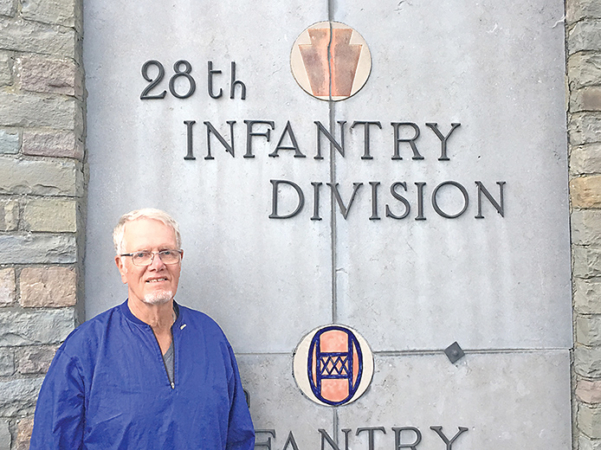As chronicled previously, Dad had kept a journal of his military experiences from the day he enlisted in January 1941 until the summer of 1944 when his unit received orders to embark for Normandy. Following that time, my recollection of his wartime movements came via conversations we shared over the years. Some of those stories were vivid, others he at times was reluctant to discuss.
After the Allies’ two-month push to drive the Germans out of France, one of Dad’s happier moments came on August 25, 1944, when he and thousands of other Allied troops marched through the Arc D’ Triumph as Paris was liberated. He recalled his unit marching through the Arc to the jubilation and appreciation of the French people.
With the German army being pushed back to their own country’s borders, all seemed relatively quiet through the autumn of that year. Dad’s 28th Division left France and enjoyed some downtime in Luxembourg and Belgium. Many thought it was just a matter of time until the war would be over. Those notions were suddenly smashed as the Germans made one final push to retake ground they had lost, and on December 16, the bloody Battle of the Bulge commenced.
In that 1944 winter, Dad’s unit was among a massive Allied force that invaded German soil. He was engaged in bitter fighting during the Battle of the Bulge until January 25, 1945, as the Allies drove into Germany seeking to destroy the Germans’ ability to supply themselves. The battle took a heavy toll as 80,000 Americans and more than 100,000 Germans were killed.
To fulfill our mission to trace Dad’s WWII footsteps, Doug had been able to identify a Belgium guide willing to help us out. This was to be no ordinary, book-smart trained guide. His name was Henry Migion, a spry 84-year-old man who was a nine-year-old boy living in a farmhouse just outside Bastogne, Belgium, when the Battle of the Bulge broke out. He had lived the horror first-hand, and the stories he would tell us commanded our constant attention.
Not knowing exactly where Dad had been during the Battle of the Bulge, Henry agreed to take us along the known general path of the 28th Division’s movements. Similar to what we had experienced in Normandy, the small Belgium villages all had erected various size monuments thanking the American troops for what they had done to gain their freedom.
Dad had talked a lot about the miserable conditions faced while fighting in the Hurtgen Forests stretched out along the Belgium/Germany border. He described them as being bitterly cold, dark and penetrating. As Henry led us into the forest of winding paths, I immediately sensed what Dad’s description had meant.
The denseness of the trees blocked out the July sun. Heavy moss covered the forest floor, and as I stood there wearing a light windbreaker in the middle of the summer, I could still feel a penetrating chill. I can’t imagine what it would have been like at this same location in the dead of winter.
Dad described his movements in the Hurtgen Forest as gaining small segments of ground, digging foxholes, surviving the artillery shelling, and doing the exact same things the next day. Move, dig, and take cover was his mode of survival for two horrendous months. During our forest visit, Henry showed us the remnants of foxholes; trenches dug to provide the GI’s with movement without exposing themselves and the remains of German entrenched bunkers.
Although I could never establish the exact location, I recall Dad’s somber tale regarding his brother, Warren. As the Battler of the Bulge raged on, Dad was summoned to a battle site several miles from his own location to the grim task of identifying the body of his younger brother who had been killed in action. Dad had said that he didn’t even know his brother was in Germany.
Dad considered himself lucky and stressed over Warren’s passing, explaining that he had some very close calls.
In one instance, he and some buddies decided to scope out a nearby farmhouse with chickens roaming the yard. They intended to get some fresh eggs and maybe a bird or two. As they approached, they saw German soldiers on the other side of the farm, apparently with the same objective in mind. Dad’s group laid low and exited the premises as quietly as they could. Within minutes, artillery rained down on the farmhouse. Looking back, they could see the German soldiers lying dead among the chickens.
On another occasion, Dad had walked down a forest path and upon returning voices from soldiers in the bushes, ordered him to stop with hands up. He figured it was the Germans and that he would be killed. Instead, it was an American patrol. They told him not to move as the path was loaded with mines the Germans had placed there. He waited as the GI’s disarmed the mines. He had just walked down this same path and by some miracle, had avoided stepping on any of the mines. With death all around him, he seemed to have had a guardian angel looking over him.
As we continued on our two-day journey with Henry, his stories amazed us.
He told us about going to school on December 16 with the teacher telling them to go home and come back tomorrow. They never did return to school until a year later.
Upon returning home, he found the Germans occupying their farmhouse. They did not harm his family, but they were forced to live in the basement with the Germans using the rest of the house and his mother cooking meals for them. Henry described the Germans as polite and remembers them telling him if the S.S. troops ever showed up to run and hide as they were vicious. Even the regular German Army was leery of them.
The Americans and the British retaliated with a massive two-day bombing campaign. Henry recalls seeing the sky filled day and night with hundreds of bombers, saying that he will never forget the sound.
During an apparent cessation in the bombing, Henry’s father ventured out into his fields to see if any of the livestock were alive. While there, an Allied bomb exploded nearby with the resulting shrapnel striking him in the chest, killing him.
As he told the story, I reluctantly asked about his feelings toward Americans. Somewhat surprisingly, his response was similar to what we had heard in Normandy. He said he was deeply saddened his father was killed, but even at that young age, he knew the Americans had to prevail for them to be able to live their lives in freedom.
He later took us to a tavern, still standing there today, at a key crossroads used by the advancing American troops. He then stood on the very spot he did 75 years ago and showed us where he waved to the passing Americans. He recalls the troops throwing them candy, cigarettes, and chewing gum. Not knowing what chewing gum was the young Belgium children at first tried to eat it.
A special treat was American white bread. They had never seen that before, and it was soft and sweet, a stark contrast to the dark hard-crusted bread they had consumed all their lives.
A final solemn moment occurred when Henry took us to a site described as the ‘Malmedy Massacre.’
It was at this location that members of that feared 1st German SS Panzer Division captured 84 American prisoners of war on December 17, 1944. The German captors assembled the Americans in a field and shot them to death with machine guns. That was 75 years ago, but as I stood there amidst a lush green, grassy field with cows grazing around us on that very site, my eyes filled with water, and I had to walk away.
War has always been described as hell, but after our 12 days of history, tracing steps had shown us mankind is out of their collective minds to ever let this happen again.
It was a trip of a lifetime that Doug and I will always remember. We not only shared it together, we brought Dad’s journal memories and his dog tags along for the ride.
By Scott N. Lowery
(Note: This is the final segment of a four-part story of my July trip to Europe re-tracing the path my father, Ralph N. Lowery, took as a member of the Pennsylvania 28th Division during World War II. The segment reveals actions that took place in and around Hurtgen Forest and Bastogne, Belgium.)





Leave a Comment
Your email address will not be published. Required fields are marked with *